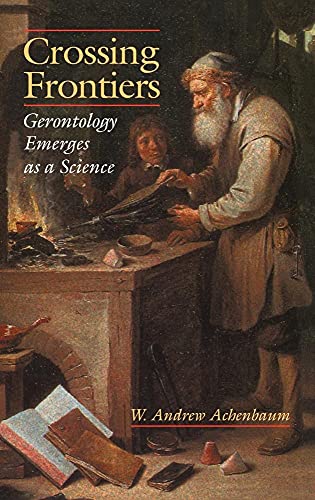Verwandte Artikel zu Crossing Frontiers: Gerontology Emerges as a Science

Inhaltsangabe
This is the first book-length study of the history of gerontology. It shows how old age became a 'problem' worth investigating and how a mulitidisciplinary orientation took shape.
Die Inhaltsangabe kann sich auf eine andere Ausgabe dieses Titels beziehen.
Über die Autorin bzw. den Autor
Charlotte y Peter Fiell son dos autoridades en historia, teoría y crítica del diseño y han escrito más de sesenta libros sobre la materia, muchos de los cuales se han convertido en éxitos de ventas. También han impartido conferencias y cursos como profesores invitados, han comisariado exposiciones y asesorado a fabricantes, museos, salas de subastas y grandes coleccionistas privados de todo el mundo. Los Fiell han escrito numerosos libros para TASCHEN, entre los que se incluyen 1000 Chairs, Diseño del siglo XX, El diseño industrial de la A a la Z, Scandinavian Design y Diseño del siglo XXI.
Von der hinteren Coverseite
Although philosophers, physicians, and others have long pondered the meanings and experiences of growing older, gerontology did not emerge as a scientific field of inquiry in the United States until the twentieth century. The study of aging borrows from a variety of other disciplines, including medicine, psychology, sociology, and anthropology, but its own scientific basis is still developing. Crossing Frontiers is the first book-length study of the history of gerontology. By tracing intellectual networks and analyzing institutional patterns, W. Andrew Achenbaum explores how old age became a "problem" worth investigating and how a multidisciplinary orientation took shape. Gerontology is a marginal intellectual enterprise but its very strengths and weaknesses illuminate the politics of specialization and academic turf-fighting in U.S. higher education.
„Über diesen Titel“ kann sich auf eine andere Ausgabe dieses Titels beziehen.
EUR 6,69 für den Versand von Vereinigtes Königreich nach Deutschland
Versandziele, Kosten & DauerNeu kaufen
Diesen Artikel anzeigenEUR 5,78 für den Versand von Vereinigtes Königreich nach Deutschland
Versandziele, Kosten & DauerSuchergebnisse für Crossing Frontiers: Gerontology Emerges as a Science
Crossing Frontiers: Gerontology Emerges as a Science
Anbieter: WeBuyBooks, Rossendale, LANCS, Vereinigtes Königreich
Zustand: Good. Most items will be dispatched the same or the next working day. A copy that has been read but remains in clean condition. All of the pages are intact and the cover is intact and the spine may show signs of wear. The book may have minor markings which are not specifically mentioned. Artikel-Nr. wbs8860863914
Anzahl: 1 verfügbar
Crossing Frontiers: Gerontology Emerges as a Science
Anbieter: Ria Christie Collections, Uxbridge, Vereinigtes Königreich
Zustand: New. In. Artikel-Nr. ria9780521481946_new
Anzahl: Mehr als 20 verfügbar
Crossing Frontiers : Gerontology Emerges as a Science
Anbieter: AHA-BUCH GmbH, Einbeck, Deutschland
Buch. Zustand: Neu. Druck auf Anfrage Neuware - Printed after ordering - Although philosophers, physicians, and others have long pondered the meanings and experiences of growing older, gerontology did not emerge as a scientific field of inquiry in the United States until the twentieth century. The study of aging borrows from a variety of other disciplines, including medicine, psychology, sociology, and anthropology, but its own scientific basis is still developing. Crossing Frontiers is the first book-length study of the history of gerontology. By tracing intellectual networks and analyzing institutional patterns, W. Andrew Achenbaum explores how old age became a 'problem' worth investigating and how a multidisciplinary orientation took shape. Gerontology is a marginal intellectual enterprise but its very strengths and weaknesses illuminate the politics of specialization and academic turf-fighting in U.S. higher education. Artikel-Nr. 9780521481946
Anzahl: 1 verfügbar

